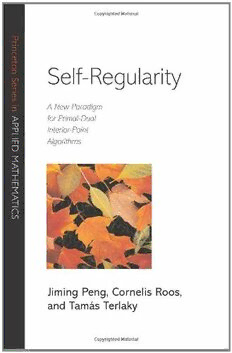Download Self-Regularity: A New Paradigm for Primal-Dual Interior-Point Algorithms PDF Free - Full Version
Download Self-Regularity: A New Paradigm for Primal-Dual Interior-Point Algorithms by Jiming Peng, Cornelis Roos, Tamas Terlaky in PDF format completely FREE. No registration required, no payment needed. Get instant access to this valuable resource on PDFdrive.to!
About Self-Regularity: A New Paradigm for Primal-Dual Interior-Point Algorithms
Research on interior-point methods (IPMs) has dominated the field of mathematical programming for the last two decades. Two contrasting approaches in the analysis and implementation of IPMs are the so-called small-update and large-update methods, although, until now, there has been a notorious gap between the theory and practical performance of these two strategies. This book comes close to bridging that gap, presenting a new framework for the theory of primal-dual IPMs based on the notion of the self-regularity of a function. The authors deal with linear optimization, nonlinear complementarity problems, semidefinite optimization, and second-order conic optimization problems. The framework also covers large classes of linear complementarity problems and convex optimization. The algorithm considered can be interpreted as a path-following method or a potential reduction method. Starting from a primal-dual strictly feasible point, the algorithm chooses a search direction defined by some Newton-type system derived from the self-regular proximity. The iterate is then updated, with the iterates staying in a certain neighborhood of the central path until an approximate solution to the problem is found. By extensively exploring some intriguing properties of self-regular functions, the authors establish that the complexity of large-update IPMs can come arbitrarily close to the best known iteration bounds of IPMs. Researchers and postgraduate students in all areas of linear and nonlinear optimization will find this book an important and invaluable aid to their work.
Detailed Information
| Author: | Jiming Peng, Cornelis Roos, Tamas Terlaky |
|---|---|
| Publication Year: | 2002 |
| Pages: | 202 |
| Language: | English |
| File Size: | 1.183 |
| Format: | |
| Price: | FREE |
Safe & Secure Download - No registration required
Why Choose PDFdrive for Your Free Self-Regularity: A New Paradigm for Primal-Dual Interior-Point Algorithms Download?
- 100% Free: No hidden fees or subscriptions required for one book every day.
- No Registration: Immediate access is available without creating accounts for one book every day.
- Safe and Secure: Clean downloads without malware or viruses
- Multiple Formats: PDF, MOBI, Mpub,... optimized for all devices
- Educational Resource: Supporting knowledge sharing and learning
Frequently Asked Questions
Is it really free to download Self-Regularity: A New Paradigm for Primal-Dual Interior-Point Algorithms PDF?
Yes, on https://PDFdrive.to you can download Self-Regularity: A New Paradigm for Primal-Dual Interior-Point Algorithms by Jiming Peng, Cornelis Roos, Tamas Terlaky completely free. We don't require any payment, subscription, or registration to access this PDF file. For 3 books every day.
How can I read Self-Regularity: A New Paradigm for Primal-Dual Interior-Point Algorithms on my mobile device?
After downloading Self-Regularity: A New Paradigm for Primal-Dual Interior-Point Algorithms PDF, you can open it with any PDF reader app on your phone or tablet. We recommend using Adobe Acrobat Reader, Apple Books, or Google Play Books for the best reading experience.
Is this the full version of Self-Regularity: A New Paradigm for Primal-Dual Interior-Point Algorithms?
Yes, this is the complete PDF version of Self-Regularity: A New Paradigm for Primal-Dual Interior-Point Algorithms by Jiming Peng, Cornelis Roos, Tamas Terlaky. You will be able to read the entire content as in the printed version without missing any pages.
Is it legal to download Self-Regularity: A New Paradigm for Primal-Dual Interior-Point Algorithms PDF for free?
https://PDFdrive.to provides links to free educational resources available online. We do not store any files on our servers. Please be aware of copyright laws in your country before downloading.
The materials shared are intended for research, educational, and personal use in accordance with fair use principles.

